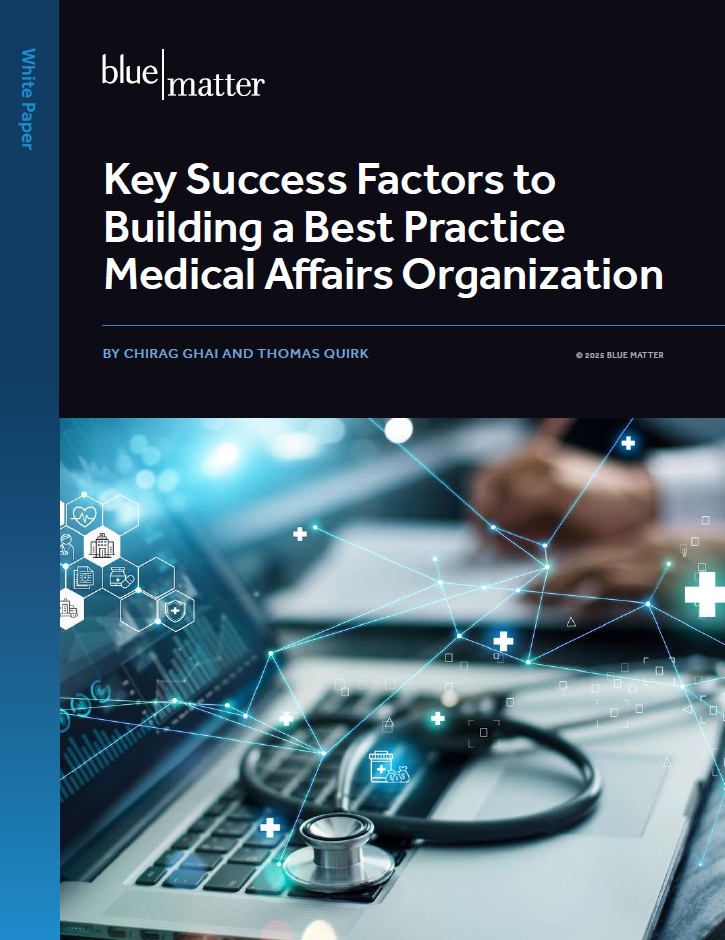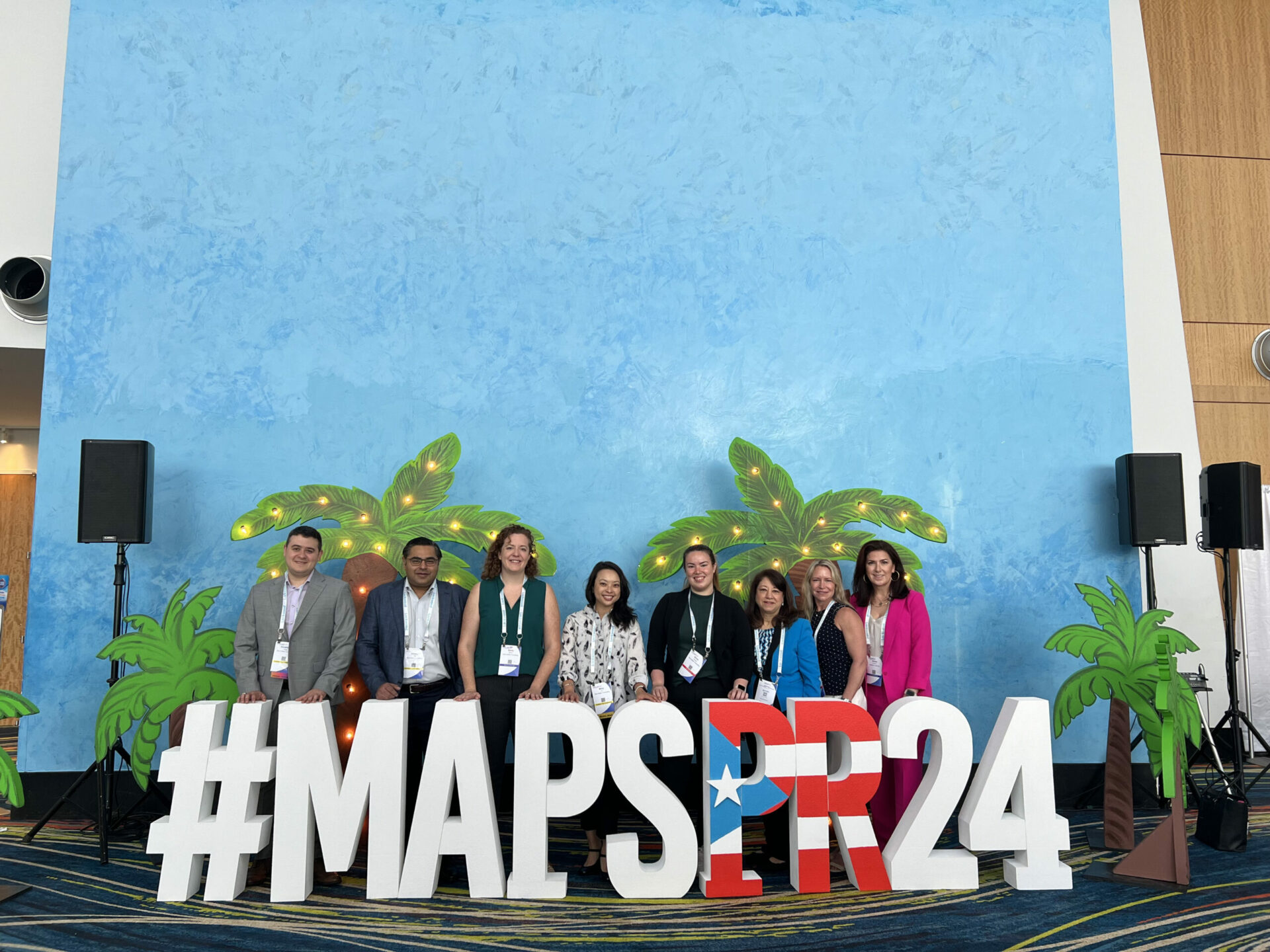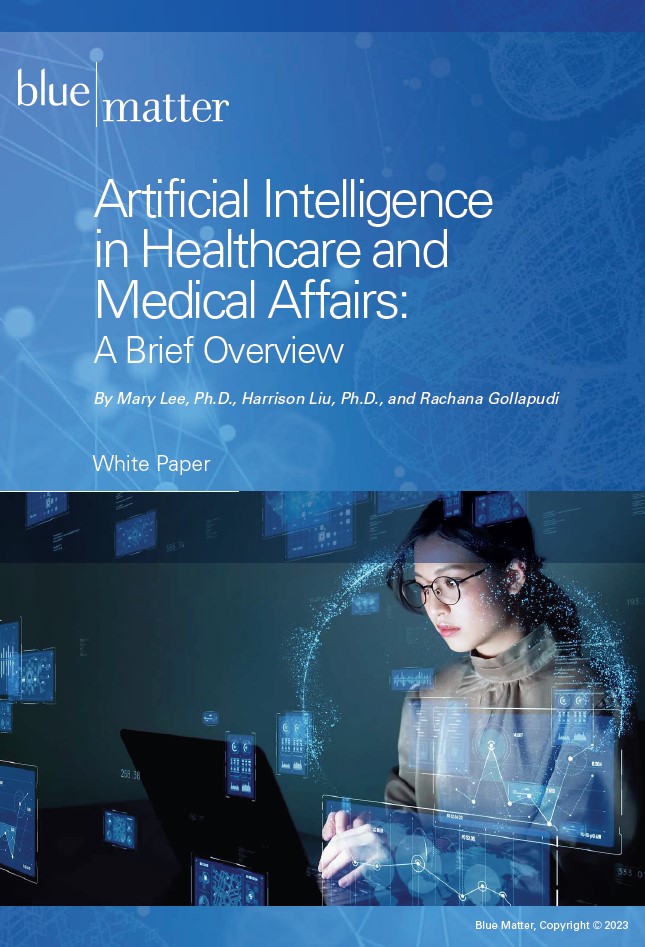
The Medical Affairs Professional Society (MAPS) held its annual Americas meeting in “The Big Easy,” New Orleans, LA from March 23-26. This year, nearly 1,500 medical affairs (MA) experts and leaders made the journey to a few feet below sea level to attend sessions and workshops, visit with colleagues and vendors, and discuss the latest in their field.
Blue Matter sent five team members to this year’s meeting (all listed as authors above) to keep a pulse check on the challenges and innovations shaping the future of Medical Affairs. This white paper summarizes four high-impact themes that emerged from MAPS 2025—insights that are top-of-mind for MA leaders and highly relevant for biopharma organizations striving to elevate Medical Affairs as a strategic partner. In this relatively short blog post, we identify and comment on those items. Let’s dive in.
Takeaway #1 – MA’s Role in Launch Is Becoming More Strategic and Proactive
Multiple sessions reinforced that MA is playing an indispensable role in launch planning and execution—particularly for assets in new indications or innovative MOAs.
The launch process for MA often begins upon pivotal data readout (or earlier), months before any regulatory submissions. Its role in establishing a favorable environment for launch uptake cannot be overstated. For example, MA’s efforts are critical to:
- Equipping HCPs and internal teams to identify eligible patients through disease awareness initiatives, patient registries / databases, etc.
- Establishing testing and diagnostic paradigms where needed
- Driving awareness and understanding of the MOA and pivotal data
- Supporting KOLs in addressing anticipated clinical concerns (i.e., AE management)
- Shaping treatment guidelines and referral patterns
- Informing payer and HTA understanding of unmet needs and disease burden
The conversations at MAPS suggest a shift in the Medical Affairs mindset—from a traditional support function to a core strategic contributor capable of proactively shaping clinical practice and “laying the foundation” for innovative new therapies.
Takeaway #2 – Non-Traditional Stakeholders Require New Engagement Models
Historically, MA has been the major conduit for providing medical information to KOLs and HCPs through well-established channels, including MSL-led scientific exchange, publications, Medical contact centers, etc. However, new “non-specialist” stakeholders such as patients, digital influencers, and online health communities are playing an increasingly prominent role in shaping perceptions and guiding care decisions. These new stakeholders add to an already expanded pool of multidisciplinary team members and healthcare decision makers that the Medical team must now support for many therapies. To remain at the forefront of scientific engagement, Medical Affairs must evolve its engagement model to connect meaningfully with this broader and more dynamic stakeholder ecosystem.
Specifically, today’s highly connected digital environment provides these non-specialist stakeholders with powerful platforms to share experiences, amplify scientific narratives, and contribute to the broader exchange of health information. At the same time, the rise of generative AI tools enables these individuals to rapidly synthesize complex medical content for educational and decision-making purposes. While this “democratization” of clinical knowledge holds great potential to support more informed patient participation in healthcare decision-making, it also increases the risk of, and accelerates the spread of, misinformation.
Overall, MA teams are still playing “catch-up” and often find themselves under-equipped to engage effectively with these groups. This is due to a range of structural, operational, and compliance-related barriers.
Looking ahead, Medical Affairs must strengthen its ability to identify and engage a broader spectrum of stakeholders—including emerging non-specialist influencers. Discussions at MAPS highlighted both structural and tactical priorities: reimagining compliance processes to enable greater agility, building new digital stakeholder identification and engagement capabilities, and exploring the use of medically trained AI solutions to address stakeholder inquiries at scale.
Takeaway #3 – Cross-Functional Collaboration Is More Important Than Ever
Cross-functional collaboration was also a hot topic at the MAPS meeting this year. Increasingly, MA is enhancing its linkages to other areas of the pharmaceutical enterprise to maximize organizational impact and ultimately improve patient outcomes. Top collaboration partners for MA include the R&D, commercial, and market access teams.
Key points of collaboration include:
- Clinical trial design and endpoint selection: MA brings valuable stakeholder insight into early trial planning, helping to shape trials that meet regulatory standards while also generating data that address the real-world needs of HCPs and patients
- Value proposition development: MA will play an increasingly important role in supporting Market Access to shape and validate clinical and economic value propositions—leveraging insights from HCPs who are increasingly attuned to institutional priorities and the cost implications of care decisions
- Commercial thought partnership: A recurring priority among MA leaders at MAPS was strengthening business acumen across their teams—enabling Medical Affairs to better appreciate the interconnectedness of scientific objectives, patient needs, and commercial goals, and ultimately show up as strategic thought partners to their Commercial counterparts
Overall, MA leaders stressed the need to operate with a “strategy-first” mindset—shifting away from traditional, tactics-driven approaches toward more proactive, enterprise-aligned planning. Enhanced cross-functional collaboration also raises the organizational visibility of Medical Affairs, enabling the function to align with shared priorities, deliver measurable value, and strengthen the case for continued investment.
Takeaway #4: Custom IEGP Is Preferred Over Automated Approaches
Integrated Evidence Generation Planning (IEGP) remains central to MA’s value proposition. While technology platforms have emerged to streamline and automate IEGPs, MAPS attendees voiced a strong preference for custom, fit-for-purpose approaches.
The key driver? While technology platforms can offer efficiency and automation, they often sacrifice the strategic depth, flexibility, and nuance required for evidence generation in a highly dynamic pharmaceutical environment.
A custom IEGP allows for agility and depth that off-the-shelf solutions struggle to deliver, ultimately ensuring that evidence strategies remain aligned with corporate objectives, competitive positioning, and evolving regulatory standards—ultimately driving greater value and differentiation for the product.
As the year progresses, our team will continue to publish useful content on the latest trends, issues, and developments in MA. To stay up to date, please follow us on LinkedIn or check our blog regularly. If you’d like to connect with us directly, please fill out a Contact Form and we will reach out to you quickly!










